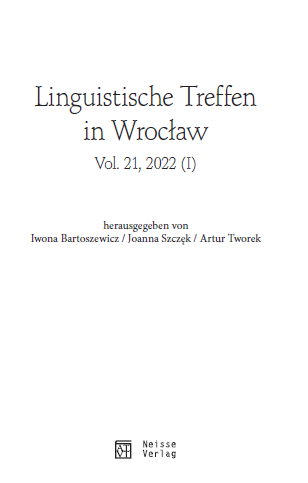Sprache im Kampf gegen Corona. Eine Analyse von Texten aus den deutschsprachigen Online-Medien
Language in the Fight Against the Coronavirus Pandemic: A Study Based on the Corpus Excerpted from German-language Internet Media
Author(s): Anna DargiewiczSubject(s): Media studies, Sociolinguistics, Health and medicine and law
Published by: Oficyna Wydawnicza ATUT – Wrocławskie Wydawnictwo Oświatowe
Keywords: Corona; corona-compounds; fight; war; pandemic; wave; corpus;
Summary/Abstract: The present article is devoted to the role of language in the fight against the world-wrecking coronavirus. The aim of the analysis was to demonstrate, on the basis of the excerpted corpus, that language has become an important tool in the combat against the destructive effects of the pandemic. It is constantly influenced by global events connected with the pandemic, reflecting their current status and revealing their multifaceted dimensions. The pandemic leaves distinct traces in our vocabulary. Depending on the stage of the global fight against the pandemic, language users create new concepts, thanks to which they are able to cope with the pandemic reality. The extent to which language manages to deal with the dynamically changing reality, which functions according to the rules dictated by the virus, can be observed particularly well in the media discourse related to the fight against the pandemic. The lexical material which constitutes the basis for the linguistic analysis described in this article was obtained between March 2020 and July 2021, as a result of a query conducted in German-language Internet media. Most of the said research material has a metaphorical quality. The analysis of the above-mentioned corpus makes it possible to state that the corona-concepts appearing in the media discourse belong to two metaphor-forming areas: one connected with military issues and war (Teststrategie, Virus-Attacke, Impfstoffkrieg) and the other – with natural disasters related to the impact of water (Corona-Tsunami Erschutterungswelle, dritte Welle). The analysis in question showed that the metaphorical representation of events related to infections caused by coronavirus SARS-CoV-2 as a wave or tsunami reflects the feeling of helplessness and huge mental stress. On the other hand, expressions derived from the language of war and military issues conceptualize the ability of the world to act and the readiness to fight against the dangerous virus. They are an important element of the crisis-related strategies. The corpus under analysis constitutes evidence that both metaphorical domains are the dominant representatives of the concept of catastrophe in the collective consciousness of the contemporary societies. Conceptualization by means of a controlled threat of war conflict and an uncontrolled threat coming from nature are realized in this corpus most frequently through the use of compounds. The process of compounding offers to German language users almost unlimited possibilities as regards constant creation of new expressions describing the reality. The metaphorically driven corona-compounds are rich in content and attract the receivers’ attention – a phenomenon which is of particular relevance to journalists. For this reason, the rules of compound word-forming processes are often the point of reference in all kinds of discourses describing new phenomena.
Journal: Linguistische Treffen in Wrocław
- Issue Year: 21/2022
- Issue No: 1
- Page Range: 47-73
- Page Count: 27
- Language: German

